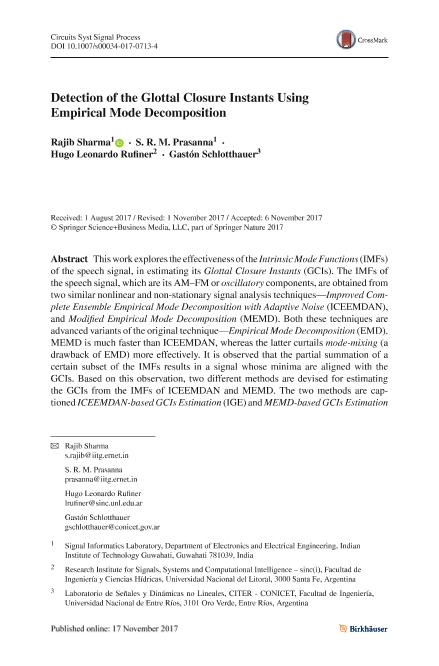Mostrar el registro sencillo del ítem
dc.contributor.author
Sharma, A. Surja

dc.contributor.author
Prasanna, S. R. M.
dc.contributor.author
Rufiner, Hugo Leonardo

dc.contributor.author
Schlotthauer, Gaston

dc.date.available
2018-04-09T20:32:34Z
dc.date.issued
2017-11
dc.identifier.citation
Sharma, A. Surja; Prasanna, S. R. M.; Rufiner, Hugo Leonardo; Schlotthauer, Gaston; Detection of the Glottal Closure Instants Using Empirical Mode Decomposition; Birkhauser Boston Inc; Circuits Systems And Signal Processing; 11-2017; 1-29
dc.identifier.issn
0278-081X
dc.identifier.uri
http://hdl.handle.net/11336/41422
dc.description.abstract
This work explores the effectiveness of the Intrinsic Mode Functions (IMFs) of the speech signal, in estimating its Glottal Closure Instants (GCIs). The IMFs of the speech signal, which are its AM–FM or oscillatory components, are obtained from two similar nonlinear and non-stationary signal analysis techniques—Improved Complete Ensemble Empirical Mode Decomposition with Adaptive Noise (ICEEMDAN), and Modified Empirical Mode Decomposition (MEMD). Both these techniques are advanced variants of the original technique—Empirical Mode Decomposition (EMD). MEMD is much faster than ICEEMDAN, whereas the latter curtails mode-mixing (a drawback of EMD) more effectively. It is observed that the partial summation of a certain subset of the IMFs results in a signal whose minima are aligned with the GCIs. Based on this observation, two different methods are devised for estimating the GCIs from the IMFs of ICEEMDAN and MEMD. The two methods are captioned ICEEMDAN-based GCIs Estimation (IGE) and MEMD-based GCIs Estimation (MGE). The results reveal that IGE and MGE provide consistent and reliable estimates of the GCIs, compared to the state-of-the-art methods, across different scenarios—clean, noisy, and telephone channel conditions.
dc.format
application/pdf
dc.language.iso
eng
dc.publisher
Birkhauser Boston Inc

dc.rights
info:eu-repo/semantics/openAccess
dc.rights.uri
https://creativecommons.org/licenses/by-nc-sa/2.5/ar/
dc.subject
Glottal Closure Instants
dc.subject
Empirical Mode Decomposition
dc.subject
Improved Complete Ensemble Empirical Mode Decomposition with Adaptive Noise
dc.subject
Modified Empirical Mode Decomposition
dc.subject
Intrinsic Mode Functions
dc.subject.classification
Ingeniería de Sistemas y Comunicaciones

dc.subject.classification
Ingeniería Eléctrica, Ingeniería Electrónica e Ingeniería de la Información

dc.subject.classification
INGENIERÍAS Y TECNOLOGÍAS

dc.title
Detection of the Glottal Closure Instants Using Empirical Mode Decomposition
dc.type
info:eu-repo/semantics/article
dc.type
info:ar-repo/semantics/artículo
dc.type
info:eu-repo/semantics/publishedVersion
dc.date.updated
2018-04-09T15:05:57Z
dc.journal.pagination
1-29
dc.journal.pais
Estados Unidos

dc.description.fil
Fil: Sharma, A. Surja. Indian Institute of Technology; India
dc.description.fil
Fil: Prasanna, S. R. M.. Indian Institute of Technology; India
dc.description.fil
Fil: Rufiner, Hugo Leonardo. Universidad Nacional del Litoral. Facultad de Ingeniería y Ciencias Hídricas. Departamento de Informática. Laboratorio de Investigaciones en Señales e Inteligencia Computacional; Argentina. Consejo Nacional de Investigaciones Científicas y Técnicas; Argentina
dc.description.fil
Fil: Schlotthauer, Gaston. Universidad Nacional de Entre Ríos. Facultad de Ingeniería. Departamento de Matemática e Informática. Laboratorio de Señales y Dinámicas no Lineales; Argentina. Consejo Nacional de Investigaciones Científicas y Técnicas. Centro de Investigaciones y Transferencia de Entre Ríos. Universidad Nacional de Entre Ríos. Centro de Investigaciones y Transferencia de Entre Ríos; Argentina
dc.journal.title
Circuits Systems And Signal Processing

dc.relation.alternativeid
info:eu-repo/semantics/altIdentifier/url/http://link.springer.com/10.1007/s00034-017-0713-4
dc.relation.alternativeid
info:eu-repo/semantics/altIdentifier/doi/http://dx.doi.org/10.1007/s00034-017-0713-4
Archivos asociados
